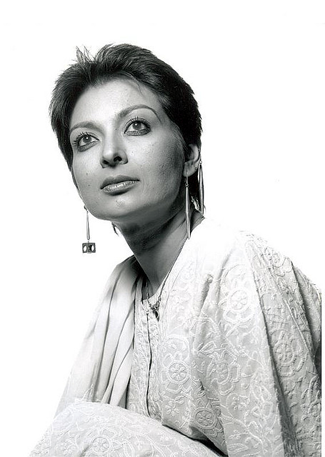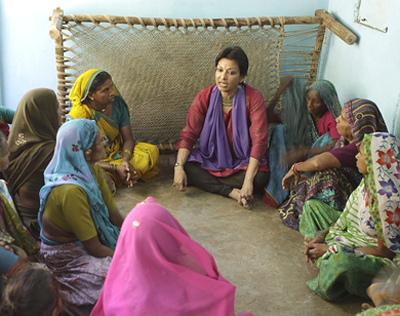Apr 24, 2024
Apr 24, 2024
 Dancer, choreographer, publisher, activist, writer, actor, politician - who is Mallika Sarabhai? She's all that but she prefers to call herself a communicator. She cares about non-violence, about nature, about cruelty, about poverty, about justice, about greed, about deprivation and, above all, about people. But one of the factors that makes Sarabhai what she is today is the fact that she comes from a family of strong women.
Dancer, choreographer, publisher, activist, writer, actor, politician - who is Mallika Sarabhai? She's all that but she prefers to call herself a communicator. She cares about non-violence, about nature, about cruelty, about poverty, about justice, about greed, about deprivation and, above all, about people. But one of the factors that makes Sarabhai what she is today is the fact that she comes from a family of strong women.
In a one-on-one, Sarabhai speaks about the illustrious women in her life, her electoral fight against former BJP president L.K. Advani, the current crisis in Kashmir and the Women's Reservation Bill.
Q: You have strong women role models in your family - your mother, Mrinalini, your paternal aunt, Mridula Sarabhai, and your maternal aunt, Captain Lakshmi Sehgal. What influence have they had on your life?
A: I can't answer for the others - none of the other Sarabhai women or men are activists, although I have several women cousins on my mother's side who are. But having such women in the family certainly left a deep desire, a burning need in me to do something for others, especially people who are under-privileged or ill treated in any way.
Q: While it is true that strong women can leave an imprint on the very fabric of society, they often suffer on the personal front. All too often they find themselves clashing with their parents, their companions, their children.
A: I have been fortunate in my family's support, although my stand against the Narendra Modi government in Gujarat lost me a lot of faint-hearted friends! Yes, of course, strong women leave an impression on society and even if they are not well known they have an impact on those in their immediate circle. I also agree that many have had to suffer the consequences of their decisions and stands; face ostracism. Many have even chosen not to have a family.
Q: How would you describe yourself? You are known to be forthright and brutally frank. Have those qualities ever landed you in trouble?
A: Yes, my bluntness and frankness have got me into a lot of hot water, but I have no time for pussyfooting. I loathe obfuscation and am not at all diplomatic. I suffer fools badly and detest society games - including what is referred to as "networking". I can't do it although in today's times I sometimes pay a heavy price for this. I believe in honesty and transparency and there is little currency for either in today's world. I believe in basic values of fairness and justice, honesty and humanity, and find it difficult and unforgivable when these are breached - which they are by almost everyone all the time.
Q: Tell us about the bond you share with your mother. What role does she play in your life?
A: I used to be called her calf, as I was always hanging on to her 'pallu'. She is pivotal in my life. She is my creative inspiration and her generosity of spirit and compassion are something I always try and emulate.
Q: In the 1950s, your paternal aunt, Mridula Sarabhai was a natural rebel. She even took on the Nehru government on the issue of Kashmiri leader Sheikh Abdullah's detention. In fact, her protest resulted in her being put under house arrest for 14 years in New Delhi. Did this development strain relations between the Sarabhais and Prime Minister Nehru? What recollections do you have of those days? And were she alive today, how do you think she would have dealt with the crisis that Kashmir is facing?
A: I was far too young then to have understood her stand. Nor did I ever get a chance to discuss it with her. But I remember her house was always being full of Kashmiris.
I also have recollections of my aunt always rushing around and in constant parlays with people. I remember her amazing gentleness just behind her gruff exterior. I remember my family pointing to me and saying, 'She will be the next boss' - which was what they would call my aunt. I also remember her cooling herself in the Delhi heat by keeping a bag of ice on her head!
Where relations with the Nehru family were concerned, papa (scientist Vikram Sarabhai) and ‘amma’ (mother) remained very close to Indiraji, so I don't think it really has any serious consequences. But she (Mridula) would certainly have been heartbroken to see the deteriorating situation in Kashmir today.
Q: You have travelled to the Valley and have even performed there with your group. What do you make of the present crisis. If you were a politician how would you have dealt with it?
A: The issue is so complex and so much ill will exists that it is difficult to say. It is awful to watch what is happening there and in the Northeast as well. I have not studied the issues intensely enough to understand all that is at play and I too get my news from the papers, which can hardly be trusted any more.
Q: You fought the last election as an independent candidate against Bharatiya Janata Party (BJP) President L.K. Advani. What was that experience like?
 A: I fought against Lal Krishna Advani from my own constituency of Gandhinagar. I hold him responsible for the new Hindu-Muslim divide in India and for the politics of hate. I also hold him responsible for corrupting the very idea of Hinduism and the Sanatan dharma - inclusiveness, acceptance, tolerance. So if I was plunging into politics it was he who I had wanted to challenge. My campaign certainly made him and his family run around - at least more than he had in the 20 years of representing this constituency. His whole family camped here for days, even having to hire a house!
A: I fought against Lal Krishna Advani from my own constituency of Gandhinagar. I hold him responsible for the new Hindu-Muslim divide in India and for the politics of hate. I also hold him responsible for corrupting the very idea of Hinduism and the Sanatan dharma - inclusiveness, acceptance, tolerance. So if I was plunging into politics it was he who I had wanted to challenge. My campaign certainly made him and his family run around - at least more than he had in the 20 years of representing this constituency. His whole family camped here for days, even having to hire a house!
Q: You lost in those elections. Do you see a future in politics?
A: I have continued working with people. I stood as an independent and the electoral system is skewed in favour of party politics and is full of loopholes. Threats and money are what elections are about today. I am not sure whether an individual ever stands a serious chance, especially here in Gujarat. But I do want to win and prove what an honest politician, deeply committed to governance, transparency and getting things done by empowering people, can achieve. But I am not sure which route to take yet.
Q: Do you believe that women politicians do make a difference, especially now that the campaign for the Women's Reservation Bill has reached fever pitch.
A: Women will make a difference if there are enough of us. We don't believe we have to become even more corrupt than the men to succeed. That's why I am convinced that time bound reservations for women are necessary.
By arrangement with WFS
08-Aug-2010
More by : Humra Quraishi

|
I was very moved by what Mallika Sarabhai said about her aunt Mridula Sarabhai. Mridula remans the most wonderful human being I have ever encountered. I was in the Quaker organisation the Friends Service Unit in Kolkata in 1948-50, and in the spring of 1950 India and Pakistan were on the brink of war because of attacks on the minority communities in East and West Bengal. Nehru despatched her to head the United Council for Relief and Welfare in West Bengal, and apart from taking that organisation by the scruff of the neck and making it into an efficient body for the relief of refugees from East Bengal, she also did much to investigate what was actually happening in East Bengal and seeing what could be done to prevent harassment and enhance security. She sent me to Bongaon on the border of the two Bengals to report on conditions for refugees, and I crossed the border to see what was happening at the last station on the other side,Benapole. The night train would not venture into India because the train crew feared they would be lynched by a mob, so the refugees had to cross the border on foot, and there were reports of attacks on them. I reported to Mridula that if the train crew had a military escort they might be willing to take the train over the border. Within hours she saw to it that this was done. I suspect that no military commander would have dared face Mridula's wrath if they had not done what she told them to do in double quick time. I remember her as a kind of flame enclosed in a human body. Her contempt for the newspapers and politicians calling for 'police action' against East Bengal warms my heart to this day. Her sheer sanity was inspiring and she was utterly fearless. I was distressed when learning that her eminently sensible views on the Kashmir poblem were disregarded. If the Government of India at the time had taken on board what she was saying, I doubt whether Kashmir would be the trouble-spot that it is today. So Mallika Sarabhai has a great inheritance, and I wish her well. |

|
I guess Arundhati Roy, Medha Patkar, Brinda Karat etc including Mallika Sarabhai are heroines for a certain breed of people! |

|
It would be very interesting if you could carry a feature on the dance dramas she has created putting forward the plight of women in India, and what she feels about Draupadi having portrayed that character for Peter Brook in the play and in the film. She is also the first to stage a hitherto unknown symphony on Shakuntala, which needs to be known widely. |

|
It is a very good snippet of the life story of Mallika Sarabhai ji. It is inspiring and her views are excellnet. Corruption in higest echelon has to be curtailed not only in India but World wide. So far for a millinium only Men have been ruling everywhere , most of the time. And no doubt that in the last fifty years or so most leadres are unashamedly corrupt. It is one thing to make a mistake and an incorrect decision but quite another to be corrupt and then take a wrong and bad decision to ruin the lives of many. Where I would like to slightly differ is that Women will automatically make non corrupt leaders. We really need a spiritual revival -- that I think women can bring about more effectively so that all our leaders men or women are honest and do not exploit the things that can devide us - like religion, Language, Foods and Culture and Gender. If the women lead the effort of such a revival - specially in India, we can all look forward to a society where Muslims and Hindus Christians, Jains, Budhists, Agnostics and Sikh admire each other rather than hate. I liked what you wrote |